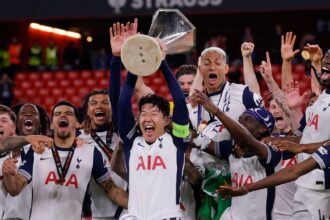In recent decades, professional sports have evolved from pure competition into multi-billion-dollar industries, captivating millions of fans worldwide. However, beneath the excitement and spectacle lies a growing concern: the integrity of the games is increasingly being compromised by the mounting influence of gambling. As sportsbooks and betting partnerships become deeply entwined with leagues and franchises, questions arise about the true cost of this relationship. This article explores how professional sports have gambled away their foundational principles, examining the risks, controversies, and potential long-term consequences of intertwining athletic competition with big-time betting.
The Rise of Betting Partnerships and Its Impact on Fair Play
In recent years, the sports industry’s increasing reliance on betting partnerships has blurred the lines between entertainment and gambling, ushering in a new era where financial incentives often overshadow the principles of fair competition. Professional leagues and teams have struck lucrative deals with betting companies, integrating wagering options directly into broadcasts and social media, subtly conditioning fans to associate sports viewing with gambling opportunities. While this symbiosis drives revenue growth and expands audience engagement, it also raises serious questions about the preservation of integrity and the potential for conflicts of interest.
Key concerns revolve around how these partnerships might compromise the rigorous enforcement of fair play rules. Critics argue that the influx of betting money can inadvertently create vulnerabilities, including the temptation for players, referees, or even coaches to manipulate outcomes. Below is a simplified look at the cascading effects of these alliances within the sports ecosystem:
| Aspect | Potential Impact |
|---|---|
| Broadcast Integration | Normalizes gambling, increasing fan betting engagement |
| Player Incentives | Raises risk of match-fixing or insider betting |
| Regulatory Oversight | Challenges enforcement due to blurred financial interests |
| Fan Experience | Transforms sports from pure competition to profit-driven spectacle |
- Increased betting advertisements during live games desensitize fans to the gambling culture surrounding their favorite teams.
- Financial dependencies make leagues less likely to scrutinize gambling-related scandals aggressively.
- Opaque sponsorship contracts often lack transparency, making accountability difficult.
Examining the Consequences of Sports Gambling on Athlete Performance and Fan Trust
Sports gambling has placed professional athletes under unprecedented scrutiny, where a single suspicious performance can trigger widespread speculation about the authenticity of the game. This pressure weighs heavily on athletes, often leading to compromised focus and altered gameplay strategies. With billions staked on outcomes, the stakes extend beyond wins and losses, threatening the very spirit of competition. Fans, once the unwavering heartbeat of sports culture, find themselves questioning the legitimacy of results, eroding the emotional connection that fuels their loyalty. The fear of manipulation-whether perceived or real-casts long shadows over athlete performance, reducing dynamic play to cautious risk management.
Key factors contributing to this decline in trust include:
- Heightened media coverage of betting scandals
- Player associations grappling with strict regulatory pressures
- The blurred lines between genuine effort and financial incentives
- Fan skepticism fueled by inconsistent officiating in high-stakes games
| Impact Area | Effect on Athlete | Fan Reaction |
|---|---|---|
| Performance Consistency | Increased anxiety, decreased risk-taking | Reduced engagement, doubtful of outcomes |
| Game Integrity | Pressure to conform to betting odds | Mistrust in league and officials |
| Public Perception | Stigma and potential sanctions | Loss of fan base and revenue |
Restoring Integrity Through Stricter Regulations and Transparent Enforcement
In response to escalating concerns over corruption and match-fixing scandals, leagues worldwide are implementing harsher rules paired with unprecedented transparency measures. The move is designed not only to punish wrongdoers but also to restore fan trust. Key changes include mandatory disclosure of betting activities by players and officials, real-time auditing of suspicious behavior, and enhanced whistleblower protections that encourage insiders to report misconduct without fear of retaliation.
These initiatives are further supported by innovative technology integrations and stricter governance frameworks. Below is a snapshot of some of the most impactful policies recently adopted by major leagues:
| Policy | Implemented By | Core Element | Expected Impact |
|---|---|---|---|
| Betting Activity Disclosure | Global Soccer Federation | Mandatory player & official reporting | Increased accountability |
| Whistleblower Protection | National Basketball Authority | Anonymous reporting with legal safeguards | Higher reporting rates |
| Real-time Suspicious Activity Audits | International Tennis Union | AI-driven behavior monitoring during matches | Faster detection of irregularities |
- Transparent Enforcement ensures every disciplinary action is publicly documented, eradicating skepticism around behind-closed-doors decisions.
- Collaboration with Betting Agencies allows for immediate flagging of abnormal wager patterns linked to game participants.
- Community Engagement Initiatives focus on educating fans and athletes about the dangers and consequences of gambling corruption.
Final Thoughts
As the fallout from these high-profile gambling scandals continues to unfold, professional sports face an urgent reckoning. The very integrity that has long underpinned fan trust and competition is now in jeopardy, prompting leagues, regulators, and stakeholders to confront uncomfortable truths. Restoring faith will require more than policy changes-it demands transparency, accountability, and a renewed commitment to the principles that make sports worth watching. Without these efforts, the games fans cherish risk becoming mere casinos, eroding the spirit and legitimacy that define true competition.














